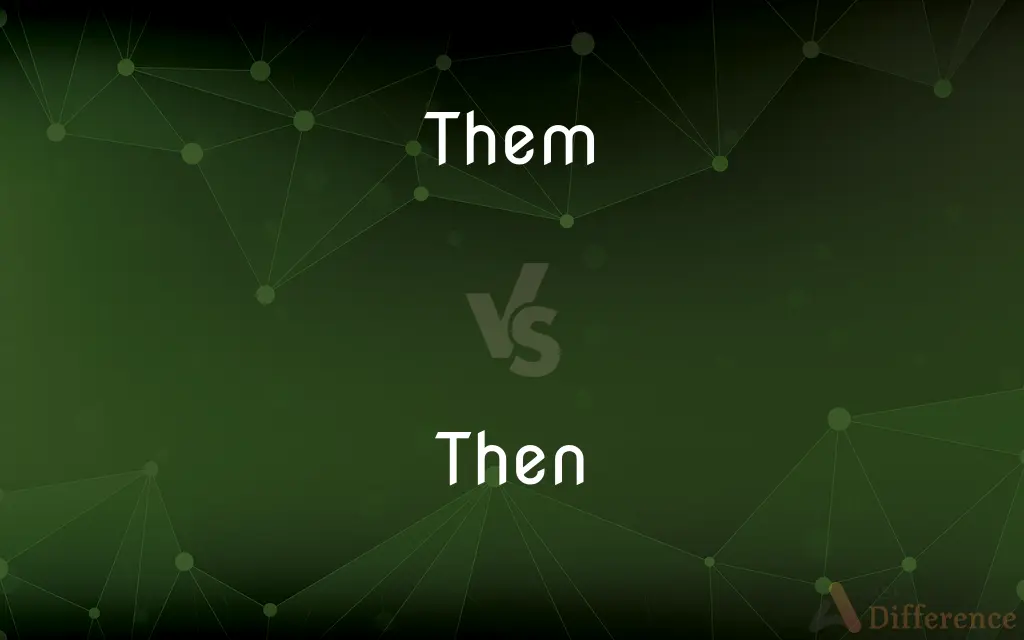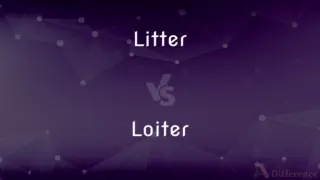Them vs. Then — What's the Difference?
By Tayyaba Rehman — Updated on October 30, 2023
"Them" is a pronoun referring to a group of people or things, while "then" refers to a time or sequence.

Difference Between Them and Then
Table of Contents
ADVERTISEMENT
Key Differences
"Them" is a pronoun used to refer to a specific group of people or things that have already been mentioned or are understood from context. It is always used to describe multiple persons or objects. On the other hand, "then" is an adverb that describes a time, sequence, or consequence. It refers to a specific point in time or the next step in a sequence.
The usage of "them" signifies inclusion or reference to a group, whether it's about giving something to them, doing something for them, or mentioning them in conversation. In contrast, "then" is about timing; it denotes what comes afterward or as a result, such as in a set of instructions or a storytelling sequence.
While "them" helps in identifying a collective subject or object within a sentence, "then" provides a temporal transition or causal relationship. If you are discussing people and you say "I will speak to them," you are identifying whom you will speak to. If you say "I will speak, then leave," you are discussing the order of events.
In terms of grammatical function, "them" is exclusively a third-person plural objective pronoun, which means it cannot serve as the subject of a sentence. "Then" functions mainly as an adverb but can also be used as a noun or adjective, as in "the then president."
Understanding the context is key to differentiating "them" from "then." While "them" could never be used to indicate time or sequence, "then" will never be used to refer to a group of people or things. These words, though similar in spelling, play unique and distinct roles within the English language.
ADVERTISEMENT
Comparison Chart
Part of Speech
Pronoun
Adverb (primarily), also used as noun or adjective
Function
Refers to a group of people or things
Indicates time or sequence
Number
Always plural
Not applicable
Case
Objective (cannot be the subject of a sentence)
Not applicable
Examples
"I saw them at the park."
"First we eat, then we go."
Compare with Definitions
Them
Pronoun indicating a specific group
The teacher praised them for their work.
Then
Adverb for subsequent time
We'll decide then.
Them
Used to refer to people previously mentioned
If you see the kids, tell them to come home.
Then
Expressing contrast or comparison
Now and then, I think of that day.
Them
A substitute for multiple people or things
Them who arrive late will not be admitted.
Then
To introduce a conclusion
If it's true, then we must act.
Them
Object of a verb or preposition
She handed them the keys.
Then
At that time; at the time in question
He accepted a peerage from the then Prime Minister, Edward Heath
Phoebe by then was exhausted
I was living in Cairo then
Them
Plural form of 'him' or 'her'
Ask them if they're coming tonight.
Then
After that; next; afterwards
She won the first and then the second game
Them
Those
"Them dogs will find the end of them footprints before ten o'clock" (William Faulkner).
Then
In that case; therefore
If you do what I tell you, then there's nothing to worry about
Well, that's okay then
Them
(in the plural) Those ones.
Then
At that time
I was still in school then. Come at noon.
I'll be ready then.
Them
Used as the direct object of a verb.
She treated them for a cold.
Then
Next in time, space, or order; immediately afterward
Watched the late movie and then went to bed.
Them
Used as the indirect object of a verb.
She wrote them a letter.
Then
In addition; moreover; besides
It costs $20, and then there's the sales tax to pay.
Them
Used as the object of a preposition.
Give it to them.
Then
Used after but to qualify or balance a preceding statement
The star was nervous, but then who isn't on the first night of a new play.
Them
(in the singular) A single person, previously mentioned, especially if of unknown or non-binary gender.
Then
In that case; accordingly
If traffic is heavy, then allow extra time.
Them
Used as the direct object of a verb.
If a student has an inappropriate question, whatever you do, do not berate them.
Then
As a consequence; therefore
The case, then, is closed.
Them
Used as the indirect object of a verb.
If one of my patients calls, please bring them their dinner.
Then
Usage Problem And after that
I showered, then combed my hair.
Them
Used as the object of a preposition.
If someone comes and asks for the ticket, just give it to them.
Then
That time or moment
The bus leaves at four.
Until then let's walk.
Them
(dialectal) Those.
Then
Being so at that time
The then chairman of the board.
Them
The objective case of they. See They.
Go ye rather to them that sell, and buy for yourselves.
Then shall the King say unto them on his right hand, Come, ye blessed of my Father.
Little stars may hide them when they list.
Then
(temporal location) At that time.
He was happy then.
Then
(temporal location) Soon afterward.
He fixed it, then left.
Turn left, then right, then right again, then keep going until you reach the service station.
Then
(sequence) Next in order of place.
There are three green ones, then a blue one.
Then
In addition; also; besides.
Then
(conjunctive) In that case.
If it’s locked, then we’ll need the key.
Is it 12 o'clock already? Then it's time for me to leave.
You don't like potatoes? What do you want me to cook, then?
Then
(sequence) At the same time; on the other hand.
That’s a nice shirt, but then, so is the other one.
Then
Used to contradict an assertion.
Then
Being so at that time.
Then
That time
It will be finished before then.
Then
Obsolete spelling of than
Then
At that time (referring to a time specified, either past or future).
And the Canaanite was then in the land.
Now I know in part; but then shall I know even as also I am known.
Then
Soon afterward, or immediately; next; afterward.
First be reconciled to thy brother, and then come and offer thy gift.
Then
At another time; later; again.
One while the master is not aware of what is done, and then in other cases it may fall out to be own act.
But that opinion, I trust, by then this following argument hath been well read, will be left for one of the mysteries of an indulgent Antichrist.
Then
Than.
Then
In that case; in consequence; as a consequence; therefore; for this reason.
If all this be so, then man has a natural freedom.
Now, then, be all thy weighty cares away.
Then
That time; that moment;
We will arrive before then
We were friends from then on
Then
At a specific prior time;
The then president
Then
Subsequently or soon afterward (often used as sentence connectors);
Then he left
Go left first, then right
First came lightning, then thunder
We watched the late movie and then went to bed
And so home and to bed
Then
In that case or as a consequence;
If he didn't take it, then who did?
Keep it then if you want to
The case, then, is closed
You've made up your mind then?
Then you'll be rich
Then
At that time;
I was young then
Prices were lower back then
Science as it was then taught
Then
Denoting the next point in a sequence
Mix the ingredients, then bake.
Common Curiosities
How is "then" primarily used in a sentence?
"Then" is primarily used as an adverb to indicate time or sequence.
Is "then" ever plural?
No, "then" does not have a plural form.
What part of speech is "them"?
"Them" is a pronoun.
Can "then" be used as a conjunction?
Yes, "then" can imply consequence and act like a conjunction in sentences.
What's the difference in pronunciation between "them" and "then"?
"Them" is pronounced with a short 'e' sound, while "then" has a more open 'e' sound.
What is the function of "them" in a sentence?
"Them" serves as the object that refers to a previously mentioned group.
Does "then" have an opposite?
Its conceptual opposite in terms of sequence is "now," but it does not have a direct antonym.
How do you distinguish between "them" and "then" when speaking?
Context and pronunciation differentiate them; "them" has a voiced 'th' sound, and "then" has an unvoiced 'e'.
Can "them" be used for singular nouns?
No, "them" is only used for plural nouns.
Can "then" be used at the beginning of a sentence?
Yes, "then" can start a sentence when indicating a time sequence.
Can "them" refer to inanimate objects?
Yes, "them" can refer to multiple inanimate objects.
How can I remember the difference between "them" and "then"?
Remember that "them" refers to people or things, while "then" refers to time.
Are there any exceptions to using "them" as a plural pronoun?
No, "them" is always used as a plural pronoun.
Is it grammatically correct to use "then" to compare two things?
Yes, "then" can be used to show comparison, as in "better than."
Can "then" refer to the past?
Yes, "then" can refer to a past time when used in the proper context.
Share Your Discovery

Previous Comparison
Aptitude vs. Ability
Next Comparison
Litter vs. LoiterAuthor Spotlight
Written by
Tayyaba RehmanTayyaba Rehman is a distinguished writer, currently serving as a primary contributor to askdifference.com. As a researcher in semantics and etymology, Tayyaba's passion for the complexity of languages and their distinctions has found a perfect home on the platform. Tayyaba delves into the intricacies of language, distinguishing between commonly confused words and phrases, thereby providing clarity for readers worldwide.















































